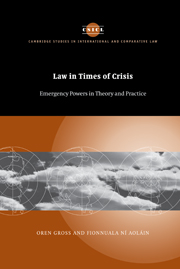Book contents
- Frontmatter
- Contents
- Acknowledgments
- Table of cases
- Table of treaties
- Table of legislation
- Table of international materials
- Introduction
- Part I
- 1 Models of accommodation
- 2 Law for all seasons
- 3 Models of extra-legality
- 4 Five degrees of separation
- Part II
- Bibliography
- Index
- CAMBRIDGE STUDIES IN INTERNATIONAL AND COMPARATIVE LAW
2 - Law for all seasons
Published online by Cambridge University Press: 03 September 2009
- Frontmatter
- Contents
- Acknowledgments
- Table of cases
- Table of treaties
- Table of legislation
- Table of international materials
- Introduction
- Part I
- 1 Models of accommodation
- 2 Law for all seasons
- 3 Models of extra-legality
- 4 Five degrees of separation
- Part II
- Bibliography
- Index
- CAMBRIDGE STUDIES IN INTERNATIONAL AND COMPARATIVE LAW
Summary
The models of accommodation are models of constitutional emergency regimes. They are based on the premise that constitutional norms and legal rules control governmental responses to emergencies and terrorist threats. The fundamental assumption that underlies these models is what we call the assumption of constitutionality: whatever responses are made to the challenges of a particular exigency, such responses are to be found and limited within the confines of the constitution.
The Business as Usual model, which is the subject of this chapter, starts from the same premise. However, this model rejects the attempt to accommodate the fight against crises and emergencies by introducing changes – constitutional, legislative, or (at least in one version of the model) by way of judicial interpretation – to the existing constitutional and legal system. Under the Business as Usual model of emergency powers, a state of emergency does not justify a deviation from the “normal” legal system. No special “emergency” powers are introduced either on an ad hoc or a permanent basis. The ordinary legal system already provides the necessary answers to any crisis without the legislative or executive assertion of new or additional governmental powers. “Extraordinary conditions do not create or enlarge constitutional power.” The occurrence of any particular emergency cannot excuse or justify a suspension, in whole or in part, of any existing piece of the ordinary legal system. Thus, Justice Davis could state in Ex parte Milligan that the constitution applied equally in times of war and in times of peace.
- Type
- Chapter
- Information
- Law in Times of CrisisEmergency Powers in Theory and Practice, pp. 86 - 109Publisher: Cambridge University PressPrint publication year: 2006
- 1
- Cited by

